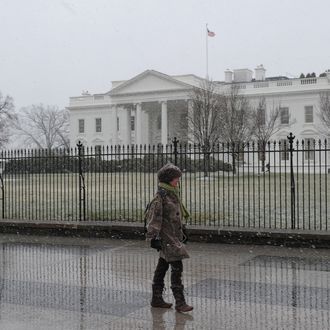
In releasing a trove of government emails documenting the development of talking points after the attack on the U.S. consulate in Benghazi last September, the White House basically said it wanted to show its work. Much of the 100 pages of emails preceding U.N. Ambassador Susan Rice’s Sept. 16 television interviews had been leaked piecemeal already. But with the dump, the New York Times posits, the White House was “hoping to show that intelligence officials, not political advisers, drove the debate over the talking points” by revealing an exchange largely between CIA and State Department officials. The dump also shows how the combined concerns of those involved diluted the document into three paragraphs that, The Wall Street Journal notes, “clearly didn’t satisfy everyone.”
David Petraeus, then the director of the CIA, scoffed at the final version of the document he received from his deputy, Mike Morell, who had removed references to CIA warnings of threats, the Times reports. “Frankly, I’d just as soon not use this,” he wrote on Saturday, Sept. 15, when he received the final three paragraphs. Rep. Dutch Ruppersberger, the senior Democrat on the House Intelligence Committee, had asked Petraeus for talking points. The General responded: “This is certainly not what Vice Chairman Ruppersberger was hoping to get.”
“The analyst who drafted the initial version of the talking points wrote at the end of the process that lawmakers ‘won’t like them. : )’ —using the happy- face emoticon,” The Journal reported. That initial report referred to “extremists with ties to al Qaeda,” but the mention of al Qaeda did not stay in.
On one handwritten page of notes by Petraeus’s deputy, Mike Morell, from Friday, Sept. 14, released with the dump, “Morell scratched out from the CIA’s early drafts of talking points mentions of al-Qaeda, the experience of fighters in Libya, Islamic extremists and a warning to the U.S. Embassy in Cairo on the eve of the attacks of calls for a demonstration,” according to the AP.
Victoria Nuland, a spokeswoman for the State Department, also had concerns over the content of the original version, writing an email on Sept. 14, that any mention of a prior warning or the involvement of al-Quaeda could be “abused by members to beat the State Department for not paying attention to agency warnings.” When she got an updated version, she wrote that it failed to “resolve all my issues or those of my building leadership.”
The Times finds the punchline after a frustrated back-and-forth that lasted Friday, Saturday, and into the morning of Sunday, Sept. 16, when the White House gave Rice the talking points: “Asked by one of Ms. Rice’s aides, ‘Is this the final language you want to use on Benghazi,’ Mr. Rhodes replied with a single word: ‘Yup.’ ”
Taken together, the e-mails would seem to stick a fork in allegations from Republicans that the talking points were crafted to deceive the American people or help President Obama’s re-election campaign. As many expected all along, they instead reveal an effort to find vague language which would satisfy the various departments involved in the editing process — a bureaucratic hallmark.





























